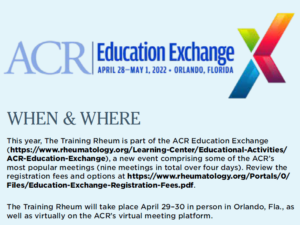
Credit: Drazen Zigic/Shutterstock.com
The 2015 American College of Rheumatology (ACR) Workforce Study projected that by 2030 the number of adult rheumatologists will decline by 25%.1 The result: Demand for rheumatologists is projected to be more than twice the available supply of providers by 2030. Advanced practice rheumatology professionals can help practices overcome the barrier this mismatch will create with regard to patient access to care.
The Training Rheum, developed by the ARP, is structured as a boot camp to give advanced practice providers the background information needed to competently take care of patients with rheumatic diseases. The 2022 ACR Education Exchange will host The Training Rheum April 29 and 30 (see sidebar and website for details).
Designed for New Practitioners
“The Training Rheum was designed specifically to educate NPs and PAs coming into the field of rheumatology,” says Carole Dodge, OTRL, CHT, allied health supervisor of rehabilitation services at Michigan Health, Ann Arbor. “Students learn the foundational concepts needed in rheumatology. These include the most common conditions encountered, ordering and interpreting laboratory tests, the use of appropriate imaging, performing musculoskeletal examinations and prescribing medications.”
Originally, The Training Rheum was a 2.5-day in-person program. That was changed with the onset of COVID-19. “Prior to the pandemic, there was talk about making The Training Rheum a hybrid teaching experience,” says Christine Stamatos, DNP, ANP-C, director of the Fibromyalgia Wellness Center at Northwell Health, Long Island, N.Y., and the immediate past president of the ARP. “Using both live and recorded [presentations] makes for a more efficient program. COVID-19 moved this along.” Currently, the program is completed over two days. It includes both recorded online lectures and live interactive question-and-answer sessions facilitated by experts to add to the educational experience.
“A practice wants to get their new NPs/PAs up to speed as quickly as possible so they can start seeing patients and be competent,” says Ms. Dodge, who also serves as the chair of the ARP e-Learning Subcommittee to the ACR Committee on Education. “The course was planned with this in mind.”
The hope going forward is to be able to present a true hybrid experience utilizing both in-person and remote learning. “If someone wants to attend from home, that will be an option,” says Dr. Stamatos. “For those who prefer a live experience, that will also be available.”



